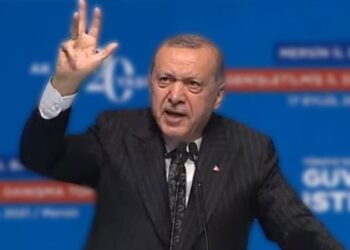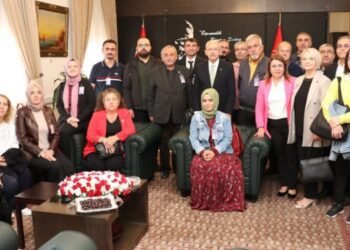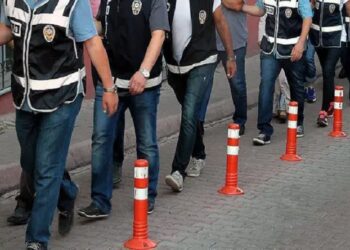Turkish people celebrate Mother’s Day on Sunday as thousands of mothers are in kept in jails by Turkish government led by President Recep Tayyip Erdoğan across the country over their alleged links to the Gülen movement or their alleged affiliation to outlawed Kurdistan Workers’ Party (PKK).
Since a controversial coup attempt on July 15, 2016 more than 17,000 women, the most of them are mothers, accompanied by 706 babies have been jailed over their alleged links to the Gülen movement.
Numbers of mothers also lost their lives as they were trying to escape from the persecution of the despotic regime of Erdoğan together with their children to the other countries.
Several mothers lost their lives in Aegean Sea or Evros River as they were trying to flee to Greece. Some of the mothers died as they were waiting in Greece to join their husbands or families abroad. Recently, Esma Uludağ, a 35-year-old Turkish woman who fled to Greece from the persecution of Erdoğan regime in Athens.
A mother of three children aged 3, 7 and 10, Esma Uludağ was a civil servant in a district governor’s office in İzmir province until she was dismissed over alleged links to the Gülen movement by a government decree issued under an ongoing state of emergency declared in the aftermath of a controversial military coup attempt on July 15, 2016.
The women are accused of providing scholarships, arranging sales, depositing money in private lender Bank Asya, sending their children to schools affiliated with the Gülen movement, subscribing to the Zaman or Bugün newspapers or using the ByLock smart phone messaging application.
Women who go to hospitals seeking birth control or to give birth have also been clear targets of massive the post-coup witch hunt campaign conducted by Erdoğan government.
However, according to the Turkish Penal Code’s Article 5275, “the sentence of imprisonment is set aside/postponed for women who are pregnant or who are within six months of conception.” Experts say that according to the law, the arrest of pregnant women and those who have infants younger than six months of age is not possible at all. The European Court of Human Rights (ECtHR) also takes born or unborn child under protection.
Women and mothers who have been jailed in an unprecedented crackdown have been subjected to torture and ill treatment in detention centers and prisons as part of the government’s systematic campaign of intimidation and persecution of critics and opponents, a report titled “Jailing Women In Turkey: Systematic Campaign of Persecution and Fear” released in April 2017 by SCF revealed.
In several cases, mothers were detained in the hospital immediately after the delivery of a baby and before they had a chance to recover. Many mothers were jailed as they were visiting their imprisoned husbands, leaving the children stranded in the ensuing chaos.
In a 28-page report issued by the Office of the United Nations High Commissioner for Human Rights (OHCHR) in March 2018 emphasised on the detention, arrest and torture of pregnant women and children in Turkey in 2017.
The report said that “OHCHR estimates that approximately 600 women with young children were being held in detention in Turkey as of December 2017, including about 100 women who were pregnant or had just given birth.
“OHCHR documented at least 50 cases of women who had given birth just prior to or just after being detained or arrested. OHCHR received a report concerning a woman who was sexually assaulted by a police officer during arrest. Moreover, NGOs brought to the attention of OHCHR at least six cases of women who were detained while they were visiting their spouses in prison. They were either detained together with their children or violently separated from them.”
Turkey survived a controversial military coup attempt on July 15, 2016 that killed 249 people. Immediately after the putsch, the Justice and Development Party (AKP) government along with President Recep Tayyip Erdoğan pinned the blame on the Gülen movement.
Fethullah Gülen, who inspired the movement, strongly denied having any role in the failed coup and called for an international investigation into it, but President Erdoğan — calling the coup attempt “a gift from God” — and the government initiated a widespread purge aimed at cleansing sympathizers of the movement from within state institutions, dehumanizing its popular figures and putting them in custody.
Turkey has suspended or dismissed more than 150,000 judges, teachers, police and civil servants since July 15. On December 13, 2017 the Justice Ministry announced that 169,013 people have been the subject of legal proceedings on coup charges since the failed coup.
Turkish Interior Minister Süleyman Soylu announced on April 18, 2018 that the Turkish government had jailed 77,081 people between July 15, 2016 and April 11, 2018 over alleged links to the Gülen movement.





















